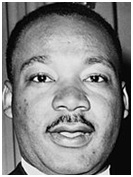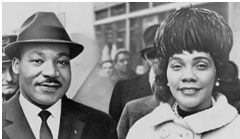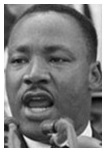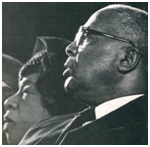|
 |
|
 |
|
|
||
Martin Luther King
Leadership
Martin Luther King (1929-68) Leader of the civil rights movement in America, which ended racial segregation and discrimination. A Baptist minister in Birmingham, Alabama, he (pictured right) believed in non-violent action and became a national hero, winning the Nobel Prize for Peace in 1964. Tragically assassinated in 1968.
For more detail see... The March on Washington in the History Highlights section.
Why was he a great leader?
1. Integrity He was a good and honest man, who practised his ideals of freedom, love and justice. He was no saint (his affairs, prompted by long absences from home, tortured him). But his family always loved and respected him enormously for his love, forgiveness and total dedication to racial equality. “His spirit will never die”, his wife, Coretta (pictured right together in 1964), said after his death.
2. Communication He was an inspirational speaker, who could communicate his message simply and powerfully, appealing to the consciences of both blacks and whites. 2. Vision Before a rally of 210,000 people in Washington in 1963, he famously said, “I have a dream” of blacks and whites living peacefully and lovingly together (pictured right).
4. Purpose He was a devout Christian, who believed that a person must love and serve God and other people, above anything else. So he totally believed in non-violent action and racial equality.
5. Courage and determination He faced enormous hatred from many whites in the south of America, which had a long history of racial discrimination, cruelty and lynchings (murders) of blacks. The lives of him and his family were constantly threatened until he was finally killed. King (pictured right in 1964 with another civil rights leader, Malcolm X) endured:
But he never despaired and believed that everyone should have a “tough mind” as well as a “tender heart”.
6. Humility Just before he died, he said not to mention all his awards at his funeral but just to say, “Martin Luther King tried to give his life serving others”.
7. Lifelong learner He never stopped learning from other people and reading. He was particularly influenced by:
8. Prepared to change In 1967 he began fighting for better jobs, housing and education not only for blacks but also for poor whites as well.
9. Support He was helped by:
He was also greatly influenced by:
His parents are pictured right.
Key quotes on leadership I have a dream. A genuine leader is...a moulder of consensus.
Key quote on America Our scientific power has outrun our spiritual power. We have guided missiles and misguided men.
Key quote on ethics The time is always right to do what’s right Nothing in all the world is more dangerous than sincere ignorance and conscientious stupidity We shall have to repent in this generation not merely for the hateful words and actions of the bad people but for the appalling silence of the good people.
Key quote on love Love is the only force capable of transforming an enemy into a friend. Forgiveness is God’s command.
Key quotes on influencing people If a man hasn’t discovered something he will die for, he isn’t fit to live The ultimate measure of a man is...where he stands at times of challenge and controversy.
Key quote on success A strong man must be a realist as well as an idealist.
Key quote on law and justice Injustice anywhere is a threat to justice everywhere.
Key quotes on empowerment Power... is the ability to achieve purpose. Power at best is love implementing the demands of justice.
Key quotes on society A great nation is a compassionate nation A riot is at bottom the language of the unheard.
|
|
|
||
|
|
||
| Copyright © wisdomtowin.com 2025 All Rights Reserved | ||
|












